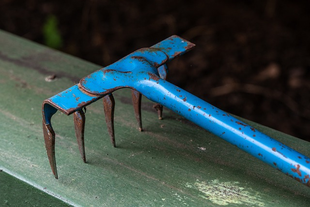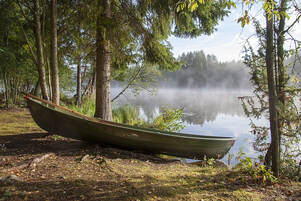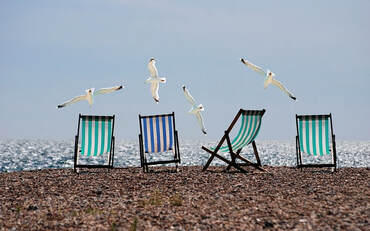
Pinecones mixed with the smoky scent of wood, snapping and cracking in the fireplace, filled the room with the heady aroma of pine. The sun's glare bounced off the Christmas tree's ornaments, causing chaotic reflections to bounce over the room. Christmas existed in full force within the room.
I leaned back in my battered leather chair and sipped on my still piping hot coffee, waiting patiently for it to cool enough to drink.
It had been decades since I first sat in this chair. The old chair was like an old friend who waited for me to come and sit every day. It had grown accustomed to my ways of sitting and melded its cushions to fit my body like a glove. Settling into the chair was much like sliding into a comfortable bed. Everything just felt right.
But nothing was right anymore. Things have changed in the last few years. Even ordinary things felt off somehow. Time had marched on, whether I liked it or not. The coffee cooled down, and the leather squeaked as I shifted. Both were familiar and comforting. The footsteps running down the hall from the past interrupted my deep thoughts on time and my old age.
It sounded more like a herd of elephants plowing through the house. Grandchildren are like that. I set my coffee on the table next to my chair, and the door bounced open, and two wildly happy and excited kids came in. My lap was immediately invaded with squirming bundles of energy.
“Grandpa!” they screamed in unison as I tried to hold them in one place. My daughter and her husband entered behind the kids.
“Billy, Robbie, get down off Grandpa.” She tried to get them down from my lap.
‘“No. No, they're okay as long as they sit still.’ I got them settled in my lap, and they calmed down a little.
After a few minutes of idle conversation about the weather and other topics, we got the kids to settle down on the floor before us and opened presents. By then, I was sipping my coffee quietly while the kids waited impatiently as presents were handed out.
An hour later, the room looked like a paper factory had exploded. Wrapping paper and boxes were all over the floor. Attempts were made to contain the mess, but it was a lost cause, with two little kids running around and playing with empty boxes and toys. In contrast, my new vinyl records, fountain pens, and books lay neatly on the table next to me, and my daughter's and son-in-law's presents were stacked next to her on the floor.
~~~
I flipped through the pages of my old journals and read my old notes about days gone by decades ago. How scribbled, barely legible lines written years ago could bring back memories was odd. Now, the grandkids are grown, and I’m up to great-grandkids. Granted, they’re little now, but those days would also pass soon.
Christmas was different as I was not as mobile as I once was. I spent most of my time in my favorite old leather chair, now crackled and worn. My oldest grandson arrived early, and I watched as he deftly started a fire in the fireplace. His small children carried pinecones collected from the stately pines on the house's ground. They giggled as the pinecones caught fire, making popping sounds. I relished their laughing as it echoed the sounds of children from the past.
This would be my last Christmas, according to my doctor. What did he know? He was as old as me, but I feared he was correct. As the morning wore on and my family gathered to celebrate the holiday, I looked forward to the chaos of children and wallpaper.
I wasn’t disappointed. While my gifts of books and music and fountain pens sat neatly stacked on the table as always. Children played with boxes and wrapping paper scattered across the rug. We laughed, we had dinner, and soon they were traveling home.
I reached for my newest fountain pen and wrote down the events of the day and my thoughts for each of them and their lives ahead. I would leave instructions that this journal be wrapped and presented to my youngest great-grandchild, who would be the keeper of the journal.
All I asked was that they scatter the wrapping paper on the floor.
I leaned back in my battered leather chair and sipped on my still piping hot coffee, waiting patiently for it to cool enough to drink.
It had been decades since I first sat in this chair. The old chair was like an old friend who waited for me to come and sit every day. It had grown accustomed to my ways of sitting and melded its cushions to fit my body like a glove. Settling into the chair was much like sliding into a comfortable bed. Everything just felt right.
But nothing was right anymore. Things have changed in the last few years. Even ordinary things felt off somehow. Time had marched on, whether I liked it or not. The coffee cooled down, and the leather squeaked as I shifted. Both were familiar and comforting. The footsteps running down the hall from the past interrupted my deep thoughts on time and my old age.
It sounded more like a herd of elephants plowing through the house. Grandchildren are like that. I set my coffee on the table next to my chair, and the door bounced open, and two wildly happy and excited kids came in. My lap was immediately invaded with squirming bundles of energy.
“Grandpa!” they screamed in unison as I tried to hold them in one place. My daughter and her husband entered behind the kids.
“Billy, Robbie, get down off Grandpa.” She tried to get them down from my lap.
‘“No. No, they're okay as long as they sit still.’ I got them settled in my lap, and they calmed down a little.
After a few minutes of idle conversation about the weather and other topics, we got the kids to settle down on the floor before us and opened presents. By then, I was sipping my coffee quietly while the kids waited impatiently as presents were handed out.
An hour later, the room looked like a paper factory had exploded. Wrapping paper and boxes were all over the floor. Attempts were made to contain the mess, but it was a lost cause, with two little kids running around and playing with empty boxes and toys. In contrast, my new vinyl records, fountain pens, and books lay neatly on the table next to me, and my daughter's and son-in-law's presents were stacked next to her on the floor.
~~~
I flipped through the pages of my old journals and read my old notes about days gone by decades ago. How scribbled, barely legible lines written years ago could bring back memories was odd. Now, the grandkids are grown, and I’m up to great-grandkids. Granted, they’re little now, but those days would also pass soon.
Christmas was different as I was not as mobile as I once was. I spent most of my time in my favorite old leather chair, now crackled and worn. My oldest grandson arrived early, and I watched as he deftly started a fire in the fireplace. His small children carried pinecones collected from the stately pines on the house's ground. They giggled as the pinecones caught fire, making popping sounds. I relished their laughing as it echoed the sounds of children from the past.
This would be my last Christmas, according to my doctor. What did he know? He was as old as me, but I feared he was correct. As the morning wore on and my family gathered to celebrate the holiday, I looked forward to the chaos of children and wallpaper.
I wasn’t disappointed. While my gifts of books and music and fountain pens sat neatly stacked on the table as always. Children played with boxes and wrapping paper scattered across the rug. We laughed, we had dinner, and soon they were traveling home.
I reached for my newest fountain pen and wrote down the events of the day and my thoughts for each of them and their lives ahead. I would leave instructions that this journal be wrapped and presented to my youngest great-grandchild, who would be the keeper of the journal.
All I asked was that they scatter the wrapping paper on the floor.





 RSS Feed
RSS Feed
